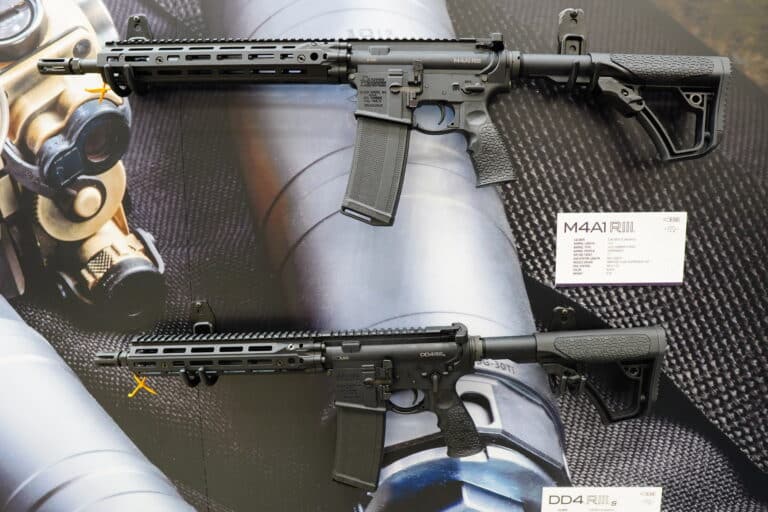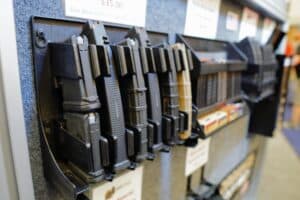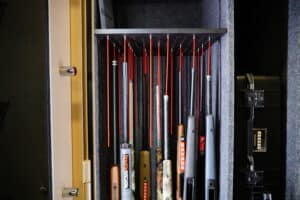Illinois and several of its localities can continue to enforce their bans on AR-15s and other semi-automatic weapons, a federal appeals court ruled Friday.
A three-judge panel for the Seventh Circuit Court of Appeals vacated a lower court decision blocking the gun bans after finding that the state and local governments “have a strong likelihood of success” in defending the law on constitutional grounds. In a 2-1 decision, the judges said that semi-automatic AR-15s and the magazines that come standard with them are not “arms” protected by the Second Amendment because they are “indistinguishable” from fully-automatic machineguns like the M16.
“Based on the record before us, we are not persuaded that the AR-15 is materially different from the M16,” Judge Diane Wood, a Bill Clinton appointee, wrote on behalf of the panel in Bevis v. Naperville. “Heller informs us that the latter weapon is not protected by the Second Amendment, and therefore may be regulated or banned. Because it is indistinguishable from that machinegun, the AR-15 may be treated in the same manner without offending the Second Amendment.”
The ruling deals a sweeping blow to gun-rights advocates in six separate lawsuits fighting gun bans in Illinois. The order—which covers bans of the state, the cities of Chicago and Naperville, and Cook County—functionally ends any hope gun-rights supporters may have had that the bans would be blocked before a decision is reached on the merits in any of the cases.
The Firearms Policy Coalition, one of the groups that secured the original district court order blocking Illinois’ ban, said it was weighing its options in the aftermath of the Seventh Circuit’s decision.
“We are reviewing the opinion and plan to respond accordingly,” the group said in a statement on X. “We will continue to fight forward.”
Illinois Attorney General Kwame Raoul (D.), whose office defended the state bans, did not respond to a request for comment.
The Seventh Circuit’s ruling is significant because it marks the first federal appeals court to issue a decision upholding state-level assault weapon bans and magazine limits since the Supreme Court’s Bruen opinion last June. It also represents a new approach to upholding those bans.
Though other federal courts have upheld hardware bans on the grounds that the affected guns and accessories aren’t “in common use” or that they represent a “dramatic technological change and unprecedented societal concern,” the Seventh Circuit did so based on non-binding dicta from the Supreme Court in Heller.
Judge Wood cited the majority’s remark in Heller that certain guns fell outside the scope of the Second Amendment, including “weapons that are most useful in military service—M–16 rifles and the like.” She then concluded that guns like the AR-15 were similar enough to M-16s to be excluded as well.
“We come to this conclusion because these assault weapons and high-capacity magazines are much more like machineguns and military grade weaponry than they are like the many different types of firearms that are used for individual self-defense (or so the legislature was entitled to conclude),” Wood wrote. “Indeed, the AR-15 is almost the same gun as the M16 machinegun. The only meaningful distinction, as we already have noted, is that the AR-15 has only semiautomatic capability (unless the user takes advantage of some simple modifications that essentially make it fully automatic), while the M16 operates both ways.”
Judge Michael B. Brennan, a Donald Trump appointee, dissented from his colleagues and argued that the Illinois bans at issue were far too broad to pass constitutional muster.
“The Second Amendment ‘right of the people to keep and bear Arms’ is not a second-class right,’” he wrote. “Yet the State of Illinois and several Illinois municipalities have categorically banned law-abiding citizens from keeping and bearing a sweeping range of firearms and magazines.”
He took particular aim at the majority’s classification of civilian semi-automatic weapons as being similar to bannable machineguns.
“In a remarkable conclusion, the majority opinion decides that these firearms are not ‘Arms’ under the Second Amendment,” Brennan wrote. “The banned arms are ‘in common use.’ They are commonly possessed by law-abiding citizens for lawful purposes, including self-defense. They may be ‘dangerous’—as are all firearms—but they are not ‘unusual,’ and thus would not be within the history and tradition recognized in Heller of prohibiting ‘dangerous and unusual’ weapons.”







2 Responses
The idea that a firearm that is limited to semi-automatic fire can be changed to become a machinegun strikes me as a fairly ridiculous legal argument to support banning those weapons. It would be like banning a block of steel because it could be crafted into a knife, or banning a pressure cooker because it could be made into an IED. Sure, you can adjust/modify a tool to make it into something illegal, but shouldn’t the limitation be on the actions of the person who is manufacturing the banned item, not the banning of all items that could be converted into something that was banned? Additionally, the idea that a semi-automatic AR-15 that is merely capable of being modified to fire more quickly should be banned would mean that basically any semi-automatic firearm should be similarly outlawed. With the right length of string you can turn an M-14 into a machinegun too (Shoestring Machine Gun (everydaynodaysoff.com)), so what is the limiting principle?
Yea, I think those are very valid points. This ruling went with a completely novel reasoning I haven’t seen before. The closest thing was the pre-Bruen ruling in favor of the Maryland “assault weapons” ban. It doesn’t strike me as a ruling that will do well if it makes it up to the Supreme Court. But I guess we’ll have to see on that front.